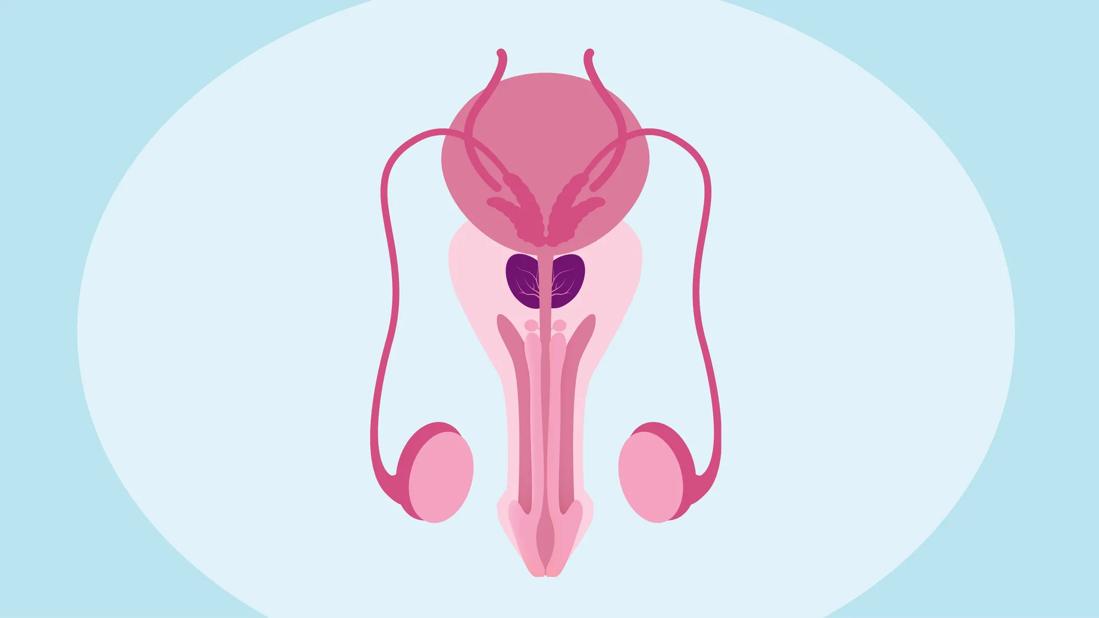Possible signs include slow urine flow and loss of bladder control — but if this common cancer is caught before it spreads, the prognosis is good

Image content: This image is available to view online.
View image online (https://assets.clevelandclinic.org/transform/41c2c80d-a27c-4838-a3bf-85861fd41dff/prostateWarningSigns-1126886075-770x533-1_jpg)
Anatomy of the male reproductive system, with prostate
Your prostate is only about the size of a walnut. But this small gland can cause big problems if left unchecked.
Advertisement
Cleveland Clinic is a non-profit academic medical center. Advertising on our site helps support our mission. We do not endorse non-Cleveland Clinic products or services. Policy
“Most men with prostate cancer don’t have symptoms at first,” says urologist Christopher Weight, MD. But if you notice certain warning signs, like changes in your pee routine or pain, it’s a good idea to visit a urologist.
Prostate cancer is one of the most common cancers in men. But when it’s found early, it’s also one of the most treatable. Knowing the signs and talking with a healthcare provider about screening could save your life.
So, what should you look out for?
Trouble starting to pee — called urinary hesitancy — is common as men get older. You may also notice slow flow or dribbling. Or your flow may stop altogether. The most common cause is benign prostatic hyperplasia. Still, if you experience these symptoms, it’s important to get your prostate checked.
A frequent and sometimes urgent need to urinate, especially at night, may be a sign of nerve damage or an infection. Or it could indicate that a tumor is putting pressure on your bladder and urethra.
Pain or burning when you pee — called dysuria — is usually linked to a urinary tract infection (UTI). But in some cases, it can signal prostate cancer. This is especially true when it’s paired with other symptoms.
Another possible warning sign of prostate cancer is hematuria, or blood in your pee. Though this can be associated with other health issues, including a UTI, it’s worth checking out.
Advertisement
Unexplained prostate pain — especially when sitting — can be an early sign of trouble. “It might also mean an infection, but only your urologist can say for certain,” Dr. Weight says.
Bladder or bowel incontinence can happen with age or other medical conditions. But if you’re leaking urine or can’t control bowel movements, talk to a doctor to rule out prostate cancer.
These symptoms can stem from many causes, but they may also signal prostate cancer. Talk to a urologist if you notice:
Sexual health is a vital part of your overall well-being. So, if something feels off, it’s not just OK to speak up — it’s vital.
These symptoms often only appear when prostate cancer has spread:
“Of course, there are endless other reasons that your back may hurt or that you have tingling in your toes that are entirely separate from any prostate troubles. But they can also be signs of later stages of prostate cancer,” Dr. Weight clarifies.
“Since early-stage prostate cancer doesn’t cause symptoms, many men don’t know they have it,” Dr. Weight notes. “That’s why regular screening is so important — it helps catch prostate cancer early, when treatment is most effective.”
A healthcare provider may recommend screening if you’re between the ages of 55 and 69, or earlier if you have a family history or other risk factors.
Screening might feel uncomfortable to think about, but skipping it could mean missing a chance to catch prostate cancer early, when it’s easier to treat.
“A simple blood test, often followed by a physical exam if needed, gives your doctor important information about your prostate health,” Dr Weight says.
Early detection doesn’t just improve treatment options — it can also give you peace of mind.
“You can’t do anything about some of the risk factors for prostate cancer, like age or family history,” Dr. Weight recognizes. “But you can make lifestyle choices that support a healthier prostate.”
These small steps may make a difference:
“When prostate cancer is diagnosed before it spreads to other parts of the body, about 99% of people live at least five years after diagnosis,” he continues. “But the survival rate is much lower if the cancer has spread.”
That’s why it’s so important to stay proactive. Regular screenings, healthy habits and paying attention to changes in your body can make all the difference. Talk to a provider about the right plan for you.
Advertisement

Sign up for our Health Essentials emails for expert guidance on nutrition, fitness, sleep, skin care and more.
Learn more about our editorial process.
Advertisement
You don’t have to cope in silence with issues like urinary incontinence and sexual dysfunction
Family history and genetics may heighten your risk for prostate cancer
Check-in with your care team, and focus on low-impact exercises and walking for good gains
Sex may be different after prostate cancer treatment, but it can still be enjoyable
Yep! Research shows a possible connection
Not following recommended follow-ups could put you at risk
High-intensity focused ultrasound (HIFU) provides new treatment options
MRI improves detection, but it's not yet a substitute for standard biopsy
Although it could be used as a moisturizer, this new trend is not recommended
Communicating clear limits helps protect your time, energy and emotional well-being
High cholesterol can be genetic, but testing and treatment can lower your heart disease risk